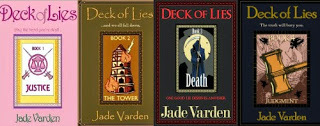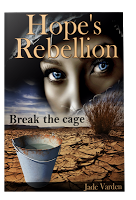Jade Varden's Blog, page 14
May 19, 2015
Writing 101: Setting the Stage
I read about these women in Burma, once. They put these coils around their necks in order to stretch them out, starting from birth. The old women in the village have these long, extended necks with coils wrapped all the way up. I’m not from Burma, so it’s hard for me to comprehend why anyone would do this, but they think that long necks are beautiful. When you’re an author, you have to set the stage for your readers so they can understand your characters. If I’m from New York City, I may not understand what it’s like to be a farmgirl from Kansas or one of those women from Burma. It’s your job to make me understand that. Do it by setting the stage.

Staging the Scene
In the medieval era, the Church officially believed that women did not have souls. Women were not human beings. They were pieces of property, and their worth could be measured against something like a cow or a piece of land. It’s hard for a modern-day woman to understand that world, a world in which women did not often speak their minds and were not welcome to pursue the skills that interested them. Women were not often writers in the medieval era; most of them could not read. So if you’re going to write a book that’s set in that time, you’re going to need to make sure that I as the reader can understand it.
In other words, don’t just throw your readers right into a world or into someone’s life without the proper context. If I don’t understand that women in the medieval era don’t speak up for themselves, I might sit through a book screaming at a heroine that I think is wimpy. “Why isn’t she saying anything!” I’ll be yelling, and you won’t hear me but you will read my scathing review later. Don't ever assume that your readers understand your setting, whether it's set in the Middle Ages or on a farm in Kansas.
Always set the stage by giving readers some background, laying some groundwork scenes, or simply explaining the world to them in a straight-on second person narrative. Give readers proper context before your characters start making decisions. Otherwise, the readers may end up confused instead.

Staging the Scene
In the medieval era, the Church officially believed that women did not have souls. Women were not human beings. They were pieces of property, and their worth could be measured against something like a cow or a piece of land. It’s hard for a modern-day woman to understand that world, a world in which women did not often speak their minds and were not welcome to pursue the skills that interested them. Women were not often writers in the medieval era; most of them could not read. So if you’re going to write a book that’s set in that time, you’re going to need to make sure that I as the reader can understand it.
In other words, don’t just throw your readers right into a world or into someone’s life without the proper context. If I don’t understand that women in the medieval era don’t speak up for themselves, I might sit through a book screaming at a heroine that I think is wimpy. “Why isn’t she saying anything!” I’ll be yelling, and you won’t hear me but you will read my scathing review later. Don't ever assume that your readers understand your setting, whether it's set in the Middle Ages or on a farm in Kansas.
Always set the stage by giving readers some background, laying some groundwork scenes, or simply explaining the world to them in a straight-on second person narrative. Give readers proper context before your characters start making decisions. Otherwise, the readers may end up confused instead.
Published on May 19, 2015 05:30
May 18, 2015
Why Virginia Woolf Walked Away From Life
Virginia Woolf was the product of a broken home, and was raised with her stepfather and several step-siblings. From an early age, she was highly emotional and had trouble coping with the various tragedies that life tossed her way. But Virginia found a way to escape the pain of her mother's untimely death, the tragic shock of her sister's unexpected death and the other sad events that occurred in her life: books. Se was given full access to her father's library, and here she fell in love with the written word. Here, she became Virginia Woolf, the author.

Being Blue
Like lots of authors, Virginia Woolf started publishing her own books. She and her husband purchased a printing press, mostly as a hobby, and pretty soon they turned it into a business. She published several novels using the press.
Virginia Woolf was a prolific writer. She wrote several books in the span of a few short years, and received recognition in her own time as a talented woman of letters.
It sounds like a happy story, doesn't it? Her life was marked by death as a child and young woman, but she discovered a love of words and found her own voice as an adult. She took matters into her own hands, like all the greatest self-published authors, and she made the world notice her. But the story of Virginia Woolf is not a happy one. Like so many others in her family, her story ends in tragedy.
Tragedy
More tragedy came into Virginia's life in the form of World War II. She had just published a book, and it wasn't being received well. She was suffering from writer's block, and having trouble concentrating. then, the Blitz. Germans came to bomb London in one of the most sustained attacks in the history of warfare, and her home was destroyed.
The darkness came back into Virginia Woolf's life, terrible events that she couldn't control and maybe couldn't understand. The ugliness of war is something that no one should really understand.
Virginia Woolf filled her pockets with rocks and walked into the sea. She was 59 years old when she drowned to death. She left a goodbye note to her husband; it was the last thing she ever wrote.
It isn't easy to live through tragedy. It isn't easy to make sense out of death or war or those other terrible things that happen in life. And it isn't easy to constantly put one's heart on the page and send it out in the world, where others sit back and judge it and comment on it and decide what it means to them. It isn't easy to search a soul for truth, write it down, and watch as the world finds fault with it. In the last days of her life, Virginia Woolf said she could not read or write. She lost a connection to the one thing that kept her grounded through all those other tragedies. She lost her best friends, books.
It became much easier to walk into the water than to stay behind on dry land and wait for whatever was going to happen next. Maybe she was tired that day she walked toward the waves, tired of waiting for the next tragedy to strike. Tired of waiting for it to get better. She was sad, surely, and felt disconnected from her words. In her final note, she said it would be better this way. So Virginia Woolf walked away from life, and the whole world became a little darker for it.
Darkness and Light
Darkness is going to come into your life. Writers keep their emotions close to the surface, where they can be accessed. Writers look hard and long at the human condition, maybe harder and longer than others. Writers take all the experiences they have, and they put them on the page so they experience them again and again. There are going to be times when it feels like there is just too much ugliness, too much sadness, too much exhaustion, too much of everything. And maybe it's easier to just walk into the ocean instead.
But it's better if you stay on dry land. Look toward the waves, but don't step into them. Do what Virginia Woolf couldn't do, and wait to see if tomorrow is any better. Who knows? Maybe it will be. At the end of the Blitz that rocked London, the mighty German Air Force was defeated. The Allies came to free Europe, and the war ended. The clouds lifted. The tragedy stopped. But Virginia Woolf was still gone from the world.

Being Blue
Like lots of authors, Virginia Woolf started publishing her own books. She and her husband purchased a printing press, mostly as a hobby, and pretty soon they turned it into a business. She published several novels using the press.
Virginia Woolf was a prolific writer. She wrote several books in the span of a few short years, and received recognition in her own time as a talented woman of letters.
It sounds like a happy story, doesn't it? Her life was marked by death as a child and young woman, but she discovered a love of words and found her own voice as an adult. She took matters into her own hands, like all the greatest self-published authors, and she made the world notice her. But the story of Virginia Woolf is not a happy one. Like so many others in her family, her story ends in tragedy.
Tragedy
More tragedy came into Virginia's life in the form of World War II. She had just published a book, and it wasn't being received well. She was suffering from writer's block, and having trouble concentrating. then, the Blitz. Germans came to bomb London in one of the most sustained attacks in the history of warfare, and her home was destroyed.
The darkness came back into Virginia Woolf's life, terrible events that she couldn't control and maybe couldn't understand. The ugliness of war is something that no one should really understand.
Virginia Woolf filled her pockets with rocks and walked into the sea. She was 59 years old when she drowned to death. She left a goodbye note to her husband; it was the last thing she ever wrote.
It isn't easy to live through tragedy. It isn't easy to make sense out of death or war or those other terrible things that happen in life. And it isn't easy to constantly put one's heart on the page and send it out in the world, where others sit back and judge it and comment on it and decide what it means to them. It isn't easy to search a soul for truth, write it down, and watch as the world finds fault with it. In the last days of her life, Virginia Woolf said she could not read or write. She lost a connection to the one thing that kept her grounded through all those other tragedies. She lost her best friends, books.
It became much easier to walk into the water than to stay behind on dry land and wait for whatever was going to happen next. Maybe she was tired that day she walked toward the waves, tired of waiting for the next tragedy to strike. Tired of waiting for it to get better. She was sad, surely, and felt disconnected from her words. In her final note, she said it would be better this way. So Virginia Woolf walked away from life, and the whole world became a little darker for it.
Darkness and Light
Darkness is going to come into your life. Writers keep their emotions close to the surface, where they can be accessed. Writers look hard and long at the human condition, maybe harder and longer than others. Writers take all the experiences they have, and they put them on the page so they experience them again and again. There are going to be times when it feels like there is just too much ugliness, too much sadness, too much exhaustion, too much of everything. And maybe it's easier to just walk into the ocean instead.
But it's better if you stay on dry land. Look toward the waves, but don't step into them. Do what Virginia Woolf couldn't do, and wait to see if tomorrow is any better. Who knows? Maybe it will be. At the end of the Blitz that rocked London, the mighty German Air Force was defeated. The Allies came to free Europe, and the war ended. The clouds lifted. The tragedy stopped. But Virginia Woolf was still gone from the world.
Published on May 18, 2015 05:30
May 16, 2015
1,000th Post Celebration: 999 Writing Tips, But This Post Ain't One
Jade's Blog has come a long way since we first started in 2011. Together, we've explored punctuation rules and grammar tricks, literary techniques and self promotion. Several guest authors and friends of the blog have stopped by to offer their insights and share their stories. And now, it's time to celebrate all of that -- by giving some free stuff away.

1,000th
Thanks for visiting the blog, whether this is your first visit or your 1,000th. Jade's blog has always been a place for indie and self-published authors, and hopefully it will be here for another 1,000 posts. But without reading, there would be no writing. So to celebrate today's milestone, let's give lots of books and other stuff away!
 The Deck of Lies
FREE sample FREE wallpaper
The Deck of Lies
FREE sample FREE wallpaper
a Rafflecopter giveaway
 Hope's Rebellion
FREE sample FREE wallpaper
Hope's Rebellion
FREE sample FREE wallpaper
a Rafflecopter giveaway
 Song of the Sea (Saltwater Secrets, #1)
Now with an exclusive sneak peek of Book #2!
Song of the Sea (Saltwater Secrets, #1)
Now with an exclusive sneak peek of Book #2!
FREE sample FREE wallpaper
a Rafflecopter giveaway
 $5 Amazon Gift Card
$5 Amazon Gift Card
a Rafflecopter giveaway

1,000th
Thanks for visiting the blog, whether this is your first visit or your 1,000th. Jade's blog has always been a place for indie and self-published authors, and hopefully it will be here for another 1,000 posts. But without reading, there would be no writing. So to celebrate today's milestone, let's give lots of books and other stuff away!
 The Deck of Lies
FREE sample FREE wallpaper
The Deck of Lies
FREE sample FREE wallpapera Rafflecopter giveaway
 Hope's Rebellion
FREE sample FREE wallpaper
Hope's Rebellion
FREE sample FREE wallpapera Rafflecopter giveaway
 Song of the Sea (Saltwater Secrets, #1)
Now with an exclusive sneak peek of Book #2!
Song of the Sea (Saltwater Secrets, #1)
Now with an exclusive sneak peek of Book #2! FREE sample FREE wallpaper
a Rafflecopter giveaway
 $5 Amazon Gift Card
$5 Amazon Gift Card
a Rafflecopter giveaway
Published on May 16, 2015 05:30
May 14, 2015
Writing 101 Redux: Further vs. Farther
It's not always easy to remember all the different rules of grammar, and that's why you need this throwback Writing 101 post about further and farther.

Find out how to tell the difference between them, and you'll always use further and farther the right way.

Find out how to tell the difference between them, and you'll always use further and farther the right way.
Published on May 14, 2015 05:30
May 13, 2015
Writing 101: The Unexpected Outcome
It’s a pretty classic story: the underdog team claws and fights their way into the big competition, only to face off against a much more powerful opponent. Against all odds, the underdogs pull together and carry the day. Unless they don’t. Sometimes, the story ends with the unexpected outcome instead. The hero doesn’t always have to win, but if you don’t write the unexpected outcome the right way you aren’t going to win, either.

When the Hero Loses
Look, good guys don’t always finish first in life. The inspiring underdogs don’t always win, the hero doesn’t always defeat the villain, and sometimes the unexpected outcome is the result. But when the unexpected happens and the hero loses, you've got to be really careful about how you end the story.
The twist ending is a powerful literary tool, particularly when you flip a stereotypical plot on its ear and surprise the audience with the unexpected outcome. But when a reader goes through an entire story expecting the good guys to win and the hero to defeat the bad guy, the twist ending can be quite shocking.
If you don’t handle it the right way, it can even be depressing. You want to buck stereotypes and surprise the reader, but you don’t want to drag your reader straight into Bummerville.
Don’t have your hero go down in defeat and that’s the end of it. Make sure that readers, and the hero, get something out of the loss. Does the hero learn a lesson? Is there hope that perhaps this outcome can be changed in the future? Has something happened because of the loss that’s really a positive thing? If you give your readers something in return for the loss, the pain of the unexpected outcome will become joy instead. That’s how you twist a story and flip it upside-down the right way. Remember that in writing, many literary devices are really trade-offs.

When the Hero Loses
Look, good guys don’t always finish first in life. The inspiring underdogs don’t always win, the hero doesn’t always defeat the villain, and sometimes the unexpected outcome is the result. But when the unexpected happens and the hero loses, you've got to be really careful about how you end the story.
The twist ending is a powerful literary tool, particularly when you flip a stereotypical plot on its ear and surprise the audience with the unexpected outcome. But when a reader goes through an entire story expecting the good guys to win and the hero to defeat the bad guy, the twist ending can be quite shocking.
If you don’t handle it the right way, it can even be depressing. You want to buck stereotypes and surprise the reader, but you don’t want to drag your reader straight into Bummerville.
Don’t have your hero go down in defeat and that’s the end of it. Make sure that readers, and the hero, get something out of the loss. Does the hero learn a lesson? Is there hope that perhaps this outcome can be changed in the future? Has something happened because of the loss that’s really a positive thing? If you give your readers something in return for the loss, the pain of the unexpected outcome will become joy instead. That’s how you twist a story and flip it upside-down the right way. Remember that in writing, many literary devices are really trade-offs.
Published on May 13, 2015 05:30
May 12, 2015
Writing 101: Who Should You Trust?
Are you a good writer, or a bad one? I’m pretty sure that every single author and would-be author has asked themselves this question. If only the answer was as simple as that. But you’re still going to want to know the answer, and you’ll find yourself searching for validation everywhere. So when you want to test your own storytelling skills, who should you trust to tell you the truth?

To Tell the Truth
Should you keep on climbing that mountain, or throw in the towel? Are you good with dialogue, bad with your narrative, terrible at descriptions or sloppy in your research? You’re going to want to know all of these things at some point, and maybe you’ll want to know them more than once. So who can you turn to for the answer that’s honest? In the literary world, there are many opinions you may want to trust. Should you?
Beta readers: It’s not hard to find beta readers, if you know where to look. Writer forums provide lots of opportunities to find someone who will take a peek at your book before you publish, so you can iron out any major problems. These people have only your best interests at heart, right?Reviewers: After you publish your book and expose it to the world at large, anyone can take the opportunity to review your book. Unsolicited reviews should be among the most honest, shouldn’t they? Agents: Literary agents are beginning to represent indie authors, and you may find yourself sending out letters in an attempt to lure one your way. Their feedback is designed to help you sell more books, so can’t you bank on what they have to say?
Who can you trust? Who will tell you the absolute truth?
There actually is a simple answer to this: stop asking questions. You can’t trust anyone, and I mean no one, to tell you the absolute truth.
There is no absolute truth. Everyone has their own version of truth, their own version of what works for them. For example, I’m not the biggest fan of Jane Austen. Half the world is crazy about her, but I really get tired of her heroines. I cannot abide to read “Wuthering Heights” ever again, and let’s not even get started on Stephen King. Yet, reviewers and sales figures would argue that I’m totally out of my mind.
Don’t trust anyone to tell you whether or not you’re a good writer. Maybe no one is a good writer. Every writer is always learning how to be a writer. They’re always figuring out how to write this particular book, this sentence, this word right here and now. Books aren’t good or bad, they’re just books. And the truth is, everybody has their own opinions and feelings about each and every one. So trust yourself when it comes to your writing, and write what you know you want to write.

To Tell the Truth
Should you keep on climbing that mountain, or throw in the towel? Are you good with dialogue, bad with your narrative, terrible at descriptions or sloppy in your research? You’re going to want to know all of these things at some point, and maybe you’ll want to know them more than once. So who can you turn to for the answer that’s honest? In the literary world, there are many opinions you may want to trust. Should you?
Beta readers: It’s not hard to find beta readers, if you know where to look. Writer forums provide lots of opportunities to find someone who will take a peek at your book before you publish, so you can iron out any major problems. These people have only your best interests at heart, right?Reviewers: After you publish your book and expose it to the world at large, anyone can take the opportunity to review your book. Unsolicited reviews should be among the most honest, shouldn’t they? Agents: Literary agents are beginning to represent indie authors, and you may find yourself sending out letters in an attempt to lure one your way. Their feedback is designed to help you sell more books, so can’t you bank on what they have to say?
Who can you trust? Who will tell you the absolute truth?
There actually is a simple answer to this: stop asking questions. You can’t trust anyone, and I mean no one, to tell you the absolute truth.
There is no absolute truth. Everyone has their own version of truth, their own version of what works for them. For example, I’m not the biggest fan of Jane Austen. Half the world is crazy about her, but I really get tired of her heroines. I cannot abide to read “Wuthering Heights” ever again, and let’s not even get started on Stephen King. Yet, reviewers and sales figures would argue that I’m totally out of my mind.
Don’t trust anyone to tell you whether or not you’re a good writer. Maybe no one is a good writer. Every writer is always learning how to be a writer. They’re always figuring out how to write this particular book, this sentence, this word right here and now. Books aren’t good or bad, they’re just books. And the truth is, everybody has their own opinions and feelings about each and every one. So trust yourself when it comes to your writing, and write what you know you want to write.
Published on May 12, 2015 05:30
May 11, 2015
Writing 101: Being An Author Will Drive You Crazy
For some reason, a certain amount of eccentricity is tolerated in artistic people. It’s weird and gross that Vincent Van Gogh cut off his ear, but he was an artist. You know how artists are. Some authors famously did really weird things, and people just accept it. But being an author can potentially drive you crazy...as in, actually insane. After all, I’m pretty sure it’s happened before…

The Crazy Ones
If you believe that you must be mad in order to be a genius, there are some authors who were most certainly geniuses. Were they mad to begin with, or did being authors drive them insane?
Jonathan Swift: According to those close to him, Jonathan Swift started to go mad later in life, around 1738. by 1742, he had to be restrained so he wouldn't harm himself. He attempted to tear out his own eyes during one episode. H. P. Lovecraft: The amazing imagination of H. P. Lovecraft may have been induced by insomnia. He had severe trouble sleeping due to night terrors, a rare sleep disorder. He suffered from depression, and later in life developed an illness that caused him chronic pain. That’s enough to drive anyone crazy.Jack Kerouac: An inspiration for writers everywhere, Jack Kerouac famously went out into the world to craft his stories. His unique writing style was purportedly fueled with alcohol and drugs. He was discharged from the Navy for a “schizoid personality.” Perhaps it made him ideally suited for life “On The Road.” Ernest Hemingway: Often heralded as one of the greatest authors ever, Hemingway is one of many authors who took his own life. His life was marked by bouts of depression and alcoholism despite the fact that he was successful and well-traveled.Kurt Vonnegut: People said that Kurt Vonnegut was mad, a diagnosis that seems supported by his suicide attempt. The reason people thought he was crazy was due to his habit of speaking his mind without much (if any) thought to the consequences.
Were they crazy? It’s said that poet Walt Whitman rode the streetcars of New York, shouting his poetry at passers-by. Truman Capote had all sorts of weird little rituals that had to be honored, or he just couldn’t write. But Hugh Hefner walks around everywhere in his bathrobe, and nobody acts like it’s weird when we all know it is.
I’ve always maintained that all writers are crazy. It’s crazy to tap into every single human emotion, feel it as deeply as possible and then spit it out all over the page. It’s crazy to re-live all your own experiences, from the worst to the best, over and over again so they can be shared with the world in several different ways. It’s crazy to create an entire person out of one’s own head, then create a complete world for it to live inside. Authors are murderers. They’re lovers. They critics and judges. They’re accomplices, and allies. They create storms, save lives, break hearts and entertain.
And sometimes, it’s going to get overwhelming. That’s when you may find yourself shouting poetry, and hopefully you won’t find yourself trying to rip out your own eyes. When the words become too heavy to carry, put them down for a little while. Walk away, take a break and don’t let it overwhelm you. Otherwise, being an author just may drive you crazy.

The Crazy Ones
If you believe that you must be mad in order to be a genius, there are some authors who were most certainly geniuses. Were they mad to begin with, or did being authors drive them insane?
Jonathan Swift: According to those close to him, Jonathan Swift started to go mad later in life, around 1738. by 1742, he had to be restrained so he wouldn't harm himself. He attempted to tear out his own eyes during one episode. H. P. Lovecraft: The amazing imagination of H. P. Lovecraft may have been induced by insomnia. He had severe trouble sleeping due to night terrors, a rare sleep disorder. He suffered from depression, and later in life developed an illness that caused him chronic pain. That’s enough to drive anyone crazy.Jack Kerouac: An inspiration for writers everywhere, Jack Kerouac famously went out into the world to craft his stories. His unique writing style was purportedly fueled with alcohol and drugs. He was discharged from the Navy for a “schizoid personality.” Perhaps it made him ideally suited for life “On The Road.” Ernest Hemingway: Often heralded as one of the greatest authors ever, Hemingway is one of many authors who took his own life. His life was marked by bouts of depression and alcoholism despite the fact that he was successful and well-traveled.Kurt Vonnegut: People said that Kurt Vonnegut was mad, a diagnosis that seems supported by his suicide attempt. The reason people thought he was crazy was due to his habit of speaking his mind without much (if any) thought to the consequences.
Were they crazy? It’s said that poet Walt Whitman rode the streetcars of New York, shouting his poetry at passers-by. Truman Capote had all sorts of weird little rituals that had to be honored, or he just couldn’t write. But Hugh Hefner walks around everywhere in his bathrobe, and nobody acts like it’s weird when we all know it is.
I’ve always maintained that all writers are crazy. It’s crazy to tap into every single human emotion, feel it as deeply as possible and then spit it out all over the page. It’s crazy to re-live all your own experiences, from the worst to the best, over and over again so they can be shared with the world in several different ways. It’s crazy to create an entire person out of one’s own head, then create a complete world for it to live inside. Authors are murderers. They’re lovers. They critics and judges. They’re accomplices, and allies. They create storms, save lives, break hearts and entertain.
And sometimes, it’s going to get overwhelming. That’s when you may find yourself shouting poetry, and hopefully you won’t find yourself trying to rip out your own eyes. When the words become too heavy to carry, put them down for a little while. Walk away, take a break and don’t let it overwhelm you. Otherwise, being an author just may drive you crazy.
Published on May 11, 2015 05:30
May 7, 2015
Writing 101 Redux: Putting Your Book in Print
The whole world is reading ebooks these days, but plenty of people still love the feel of a print book. It's really easy to turn your self-published books into ebooks, and this week's TBT Writing 101 tip will tell you exactly how to do it...for free.

Putting your book in print is a bit of a procedure, but it's not difficult. Once you're in print, you can open yourself up to a lot more readers (and convince your family members that yes, you did write a book). Get yourself at least one copy of your own book, and put it on a shelf where you can show it off. Maybe one day, you'll fill the shelf with books.

Putting your book in print is a bit of a procedure, but it's not difficult. Once you're in print, you can open yourself up to a lot more readers (and convince your family members that yes, you did write a book). Get yourself at least one copy of your own book, and put it on a shelf where you can show it off. Maybe one day, you'll fill the shelf with books.
Published on May 07, 2015 05:30
May 6, 2015
Writing 101: Writing an Accent
I don’t know if I’ve mentioned it, but I’m from the south. We talk a little bit slower here, because there’s no rush. Maybe we forget a g, every now and then. People in the south speak with an accent, but so do people from Boston -- whom I cannot understand even when I really try. Writing an accent is really an art form, and it’s really easy to do badly.

Like the Way She Talks
“Ow, eez, ye-ooa san, is e? Wal. fewd dan y' d-ooty bawmz a mather should, eed now bettern to spawl a pore gel's flahrzn than ran awy athaht pyin. Will ye-oo py me f'them?”
No, I didn’t just accidentally sit on my keyboard to create that mess. That’s actual text from an actual book. It’s an accent. Cockney, to be specific. Can you tell what it says? Because I can.
“Oh, he’s your son, is he? Well, if you’d done your duty by him as a mother should, he’d know better than to spoil a poor girl’s flowers, then run away without paying. Will you pay for them?”
It gets really tricky to write an accent well, and personally I think the example above could be done a whole lot better. In this example, however, the language is meant to look and sound extreme. Usually, one hopes, you’ll be writing accents that aren’t as complex as this.
When I write accents, I find that simple is usually better. Let’s re-write the example as an example of how it can be done:
“Oh, e’s y’son, izze? Well if ya’d done y’duty by ‘im as a mither shild, e’d know better’n to spioll a poor gel’s flahers, thin run away ‘thot paying. Will y’pay fir them?”
When you’re writing an accent, read it out loud. Read it again. Now read it again. Keep reading it, and make sure it’s spelled exactly a it sounds in your head. Cut out extra letters where they aren’t needed to keep it simple. And remember that it’s always easier to write without using an accent at all. But if you do, make sure that you’re still spelling y’all correctly.

Like the Way She Talks
“Ow, eez, ye-ooa san, is e? Wal. fewd dan y' d-ooty bawmz a mather should, eed now bettern to spawl a pore gel's flahrzn than ran awy athaht pyin. Will ye-oo py me f'them?”
No, I didn’t just accidentally sit on my keyboard to create that mess. That’s actual text from an actual book. It’s an accent. Cockney, to be specific. Can you tell what it says? Because I can.
“Oh, he’s your son, is he? Well, if you’d done your duty by him as a mother should, he’d know better than to spoil a poor girl’s flowers, then run away without paying. Will you pay for them?”
It gets really tricky to write an accent well, and personally I think the example above could be done a whole lot better. In this example, however, the language is meant to look and sound extreme. Usually, one hopes, you’ll be writing accents that aren’t as complex as this.
When I write accents, I find that simple is usually better. Let’s re-write the example as an example of how it can be done:
“Oh, e’s y’son, izze? Well if ya’d done y’duty by ‘im as a mither shild, e’d know better’n to spioll a poor gel’s flahers, thin run away ‘thot paying. Will y’pay fir them?”
When you’re writing an accent, read it out loud. Read it again. Now read it again. Keep reading it, and make sure it’s spelled exactly a it sounds in your head. Cut out extra letters where they aren’t needed to keep it simple. And remember that it’s always easier to write without using an accent at all. But if you do, make sure that you’re still spelling y’all correctly.
Published on May 06, 2015 05:30
May 5, 2015
Writing 101: Fake Memoirs
One of the best books I ever read was a total lie. I didn't know that for many years. It was called "Go Ask Alice," and it was a diary. The book was full of powerful imagery, and frankly talked about stuff that was really relevant to me: dating boys, worrying about skin care, coming up with new ways to style one’s hair. But mainly, it was a book about drug use. When I first read it, I didn't know there was such a thing as fake memoirs. But there is, and this can be a powerful form of storytelling.

Go Ask a Writer
There is no Alice, at least not as far as this particular book is concerned. It was published anonymously, which always made it even more intriguing, and the actual first name of the diarist is never revealed. Most believe, however, that it was written by Beatrice Sparks. She is the sole copyright holder, and she wrote several other so-called diaries that were supposedly penned by teens. But no matter who wrote it, the book is still good. I still really like it, and I've recommended it to others who liked it. People write fake memoirs because fake memoirs work. It might work for you, too.
Writing a memoir, whether or not you do it diary-style, is a great way to immerse yourself completely in a single character. You’re examining this person’s life in an in-depth way. You can connect to this character more deeply than others. That’s the appeal of writing a memoir.
And when you write a memoir that's not about you, but about a made-up person, the literary world doesn't consider it to be fake. Then, it's just called fiction.

Go Ask a Writer
There is no Alice, at least not as far as this particular book is concerned. It was published anonymously, which always made it even more intriguing, and the actual first name of the diarist is never revealed. Most believe, however, that it was written by Beatrice Sparks. She is the sole copyright holder, and she wrote several other so-called diaries that were supposedly penned by teens. But no matter who wrote it, the book is still good. I still really like it, and I've recommended it to others who liked it. People write fake memoirs because fake memoirs work. It might work for you, too.
Writing a memoir, whether or not you do it diary-style, is a great way to immerse yourself completely in a single character. You’re examining this person’s life in an in-depth way. You can connect to this character more deeply than others. That’s the appeal of writing a memoir.
And when you write a memoir that's not about you, but about a made-up person, the literary world doesn't consider it to be fake. Then, it's just called fiction.
Published on May 05, 2015 05:30



